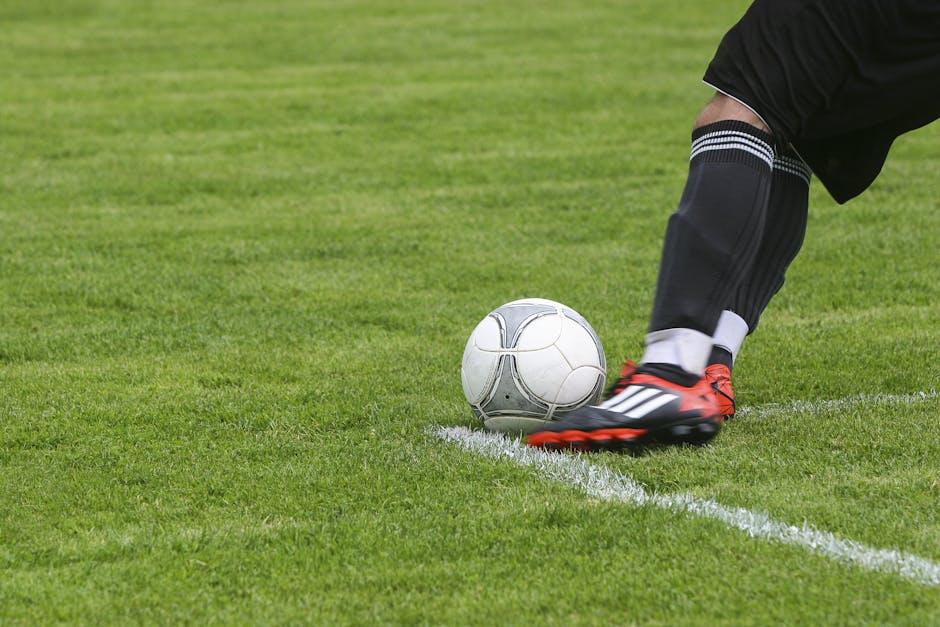The Mental Game: Psychological Skills Your Son is Developing at the Academy
When James first joined the academy at age nine, his parents focussed on the obvious benefits—professional coaching, superior facilities, and a pathway to potential footballing success.
Seven years later, his mother Sarah has a different perspective: ‘The technical training has been excellent, of course, but what’s been truly transformative is the mental toolkit he’s developed. The psychological skills he’s gained in the academy are already transferring to everything from exam preparation to handling social pressure.’
While the technical and tactical development in academies is easily observed, a powerful psychological education is simultaneously taking place—one that equips young players with mental skills that serve them far beyond football.
The Elite Mindset: More Than Just Football Skills

Modern football academies function as high-performance environments where psychological development is increasingly recognised as crucial for both sporting success and personal growth.
‘Ten years ago, we focussed almost exclusively on technical and physical development,’ explains Dr. Marcus Reed, a sports psychologist who works with several Premier League academies. ‘Today, the psychological curriculum is just as structured and intentional. We’re systematically developing mental skills that create more effective footballers, but more importantly, more capable young men.’
Core Psychological Skills Developed in Academies
| Psychological Skill | How It’s Developed | Life Application Beyond Football |
|---|---|---|
| Goal-setting | Progressive target-setting in training; individual development plans | Academic planning; career progression; personal projects |
| Performance under pressure | Competitive matches; assessment periods; trials | Exam performance; job interviews; public speaking |
| Emotional regulation | Managing frustration during challenging games; controlling pre-match nerves | Handling workplace stress; navigating social challenges; maintaining composed decision-making |
| Growth mindset | Feedback-based improvement process; skill development journeys | Approaching learning challenges; adapting to new environments; continuous self-improvement |
| Concentration and focus | Sustained attention during tactical sessions; execution under distraction | Study effectiveness; work productivity; present-moment awareness |
| Visualisation and mental rehearsal | Pre-performance mental preparation; technique rehearsal | Exam preparation; presentation planning; confidence building |
Robert, whose son was released after six years in an academy, now sees the bigger picture: ‘At the time, we were devastated about the football outcome. Two years later, watching him apply the same mental approach to his A-levels that he learnt in football—the goal-setting, the response to setbacks, the performance mindset—I realise those psychological tools might be the most valuable thing he gained.’
Goal-Setting: The Foundation of Achievement

Perhaps the most fundamental psychological skill academy players develop is structured goal-setting—a capability that transfers directly to academic, career, and personal pursuits.
The Academy Approach to Goals
Academy players typically learn sophisticated goal-setting frameworks that include:
- Outcome goals: The ultimate targets (making the starting line-up, earning a scholarship)
- Performance goals: Measurable standards to achieve (completion percentage, defensive actions)
- Process goals: Daily behaviours and habits that drive improvement (extra technical practise, nutrition adherence)
This hierarchical approach teaches players to focus primarily on the processes within their control while keeping larger ambitions in sight.
‘We noticed Luke applying this framework to his English GCSE,’ shares Diane, mother of a 15-year-old academy player. ‘He broke down his revision into specific process goals—daily reading, weekly practise essays, vocabulary building—rather than just focussing on the grade he wanted. That’s straight from his academy mental skills sessions.’
This sophisticated approach to achievement stands in stark contrast to how many non-academy children approach goals—often fixating solely on outcomes without mapping the process to get there.
Handling Pressure: The Competitive Advantage

From selection trials to showcase matches in front of scouts, academy environments regularly expose players to high-pressure situations—creating a natural laboratory for developing performance psychology skills.
‘You can always spot the academy kids during exam season,’ notes Mr. Thompson, a secondary school teacher. ‘They have these routines and mental approaches to manage pressure that other students haven’t had the opportunity to develop. They’ve been performing under scrutiny for years.’
Pressure Management Techniques
Academy players typically develop practical strategies for performing under pressure:
- Pre-performance routines: Consistent preparation sequences that create focus
- Controlled breathing: Techniques to regulate physiological response to stress
- Thought management: Identifying and redirecting unhelpful thinking patterns
- Attentional control: Focussing on relevant cues while filtering distractions
- Post-performance reflection: Structured review that separates emotion from analysis
Jason credits his son’s academy training with his ability to handle GCSE pressure: ‘The school was concerned about exam anxiety for many students, but Ethan applied the same mental preparation he uses before big matches. He had his preparation routine, his ‘game face,’ his ability to focus on the process rather than worrying about results. The psychological edge was obvious.’
Emotional Intelligence: Feeling, Understanding, Managing

The emotional landscape of elite youth sport provides countless opportunities to develop emotional awareness and regulation—capabilities increasingly recognised as critical for life success.
Academy players regularly navigate:
- Disappointment from non-selection or defeat
- Frustration with performance plateaus
- Anxiety before important evaluations
- Pride in achievement without complacency
- Balancing confidence with humility
Through these experiences, guided by coaches and increasingly by sport psychologists, players develop emotional literacy that many adults struggle to attain.
‘I’ve watched my son learn to recognise when frustration is affecting his performance and apply specific techniques to reset,’ explains Michael. ‘Now I see him using the same awareness and strategies when he’s getting stressed with schoolwork or family situations. That emotional intelligence will serve him for life.’
Research confirms that emotional regulation skills developed through sport transfer effectively to academic, social, and eventually professional environments, contributing to resilience and mental wellbeing.
Growth Mindset: Embracing the Development Journey

Perhaps the most transformative psychological development in academy environments is the cultivation of what psychologist Carol Dweck terms a ‘growth mindset’—the belief that abilities can be developed through dedication and hard work.
The academy structure naturally reenforces this mindset through:
- Continuous feedback focussed on improvement
- Visible progress through deliberate practise
- Role models demonstrating development through effort
- Celebration of process alongside outcomes
- Normalised setbacks as part of the learning journey
‘The difference in how my son and his non-sporting friends approach challenges is striking,’ observes Caroline. ‘When faced with something difficult, many of his peers say ‘I’m just not good at this’ and avoid it. He automatically thinks ‘I’m not good at this yet’ and maps out how to improve. That’s his academy mindset at work.’
This growth orientation—seeing challenges as opportunities and abilities as developable—creates a psychological foundation for lifelong learning and achievement.
Concentration and Focus: The Attention Economy

In an age of digital distraction, the focussed attention required in elite sport provides a counterbalance that develops concentrated effort.
Academy training demands:
- Sustained concentration during tactical instruction
- Present-moment awareness during performance
- Selective attention to relevant cues
- Task refocusing after distractions
- Extended practise periods requiring mental stamina
‘My son’s ability to sit down and focus deeply on schoolwork improved dramatically after a few years in the academy,’ notes Tariq. ‘He learnt to eliminate distractions and maintain concentration through those long tactical sessions and video analysis meetings. In an era when many teenagers can barely focus for ten minutes, that’s an incredible advantage.’
Visualisation and Mental Rehearsal: The Mind’s Eye

Elite sporting environments have long utilised visualisation and mental rehearsal techniques that are increasingly recognised as valuable across domains.
Academy players typically learn to:
- Mentally rehearse skills and scenarios
- Visualise successful performance outcomes
- Create detailed mental imagery incorporating multiple senses
- Use visualisation for confidence building before challenging situations
- Mentally practise resilience in difficult scenarios
‘Ben uses visualisation techniques before important school presentations just as he does before matches,’ shares his father. ‘He mentally rehearses the delivery, imagines responding well to questions, and visualises feeling confident. These mental tools were explicitly taught in his academy psychology sessions.’
Research confirms that these mental rehearsal techniques transfer effectively to public speaking, performance arts, test-taking, and numerous other non-sporting contexts.
The Team Factor: Social Psychology in Action

Beyond individual mental skills, academy players develop sophisticated understanding of group psychology through their team experiences:
- Role clarity and acceptance within collective structures
- Communication patterns that enhance group performance
- Leadership styles and their situational effectiveness
- Group dynamics and their impact on performance
- Collective resilience in the face of setbacks
These social psychological insights translate directly to future team environments in education and the workplace, often giving former academy players an edge in understanding organisational behaviour.
‘My son has an intuitive grasp of team dynamics that’s remarkable for his age,’ notes Michelle. ‘He can read a group situation, understand the social currents, and adapt his communication appropriately. Those people skills came directly from years in team sport at a high level.’
Developing These Skills at Home

Parents can reenforce these psychological skills outside the academy environment:
1. Speak the Language of Process
Reenforce the focus on controllable elements rather than outcomes:
Try this: When discussing performance (in sport or school), ask: ‘What parts of your process worked well today?’ rather than focussing exclusively on results.
2. Normalise Psychological Skills
Remove any stigma from mental training by treating it as equally important as physical development:
Try this: Discuss psychological aspects of performance openly—’How did you refocus after that setback?’ or ‘What was your mental routine before that exam?’
3. Transfer the Skills Explicitly
Help your son recognise how academy mental skills apply in other contexts:
Try this: When facing non-football challenges, ask: ‘How could you use the same mental approach that helps you before big matches?’
4. Model the Mindset
Demonstrate these psychological principles in your own life:
Try this: Share your own process-focussed goals, how you handle pressure situations, or your growth mindset in learning new skills.
5. Create Reflection Routines
Establish habits that reenforce psychological development:
Try this: Weekly ‘mental game’ conversations where football and non-football challenges are discussed through the lens of psychological skills.
When the Mind Needs Support: Recognising the Limits

While academy environments develop remarkable mental strength, parents should remain vigilant about the difference between performance psychology and mental health.
Signs that additional support may be needed include:
- Persistent anxiety that doesn’t respond to coping strategies
- Significant mood changes that affect daily functioning
- Performance obsession that dominates all aspects of life
- Identity exclusively defined by sporting achievement
- Sleep disturbances or appetite changes
- Withdrawal from previously enjoyed activities
‘The mental skills programme is not a substitute for proper mental health support when needed,’ emphasises Dr. Reed. ‘We’re developing performance psychology, but sometimes clinical intervention is required, just as with physical injuries.’
Many academies now have clinical psychologists available alongside performance psychology specialists, recognising this important distinction.
The Lifelong Mental Toolkit

For Mark, whose son was released at 16 after seven academy years, the psychological development has proven more durable than the technical skills:
‘The football-specific abilities fade without regular elite training, but the mental toolkit is permanent. Five years later, I see him approaching university assignments with the same goal-setting framework, managing exam pressure with the same techniques, and navigating social challenges with the emotional intelligence he developed through football.
‘If I had understood earlier that those psychological skills would outlast any football outcome, I would have been even more enthusiastic about the academy journey. They’re preparing these boys for life, not just for football.’
This perspective alines with research showing that the psychological capabilities developed through elite sport environments create transferable advantages in education, early career development, leadership emergence, and even entrepreneurship.
The football academy may not make your son a professional player, but it very likely is developing a psychological skillset that creates competitive advantage in whatever field he ultimately pursues.
How have you seen academy psychological skills transfer to other areas of your child’s life? We’d luv to hear your experiences in the comments below, or get in touch with us directly to share your academy journey.
Contact us to discuss our services now!
